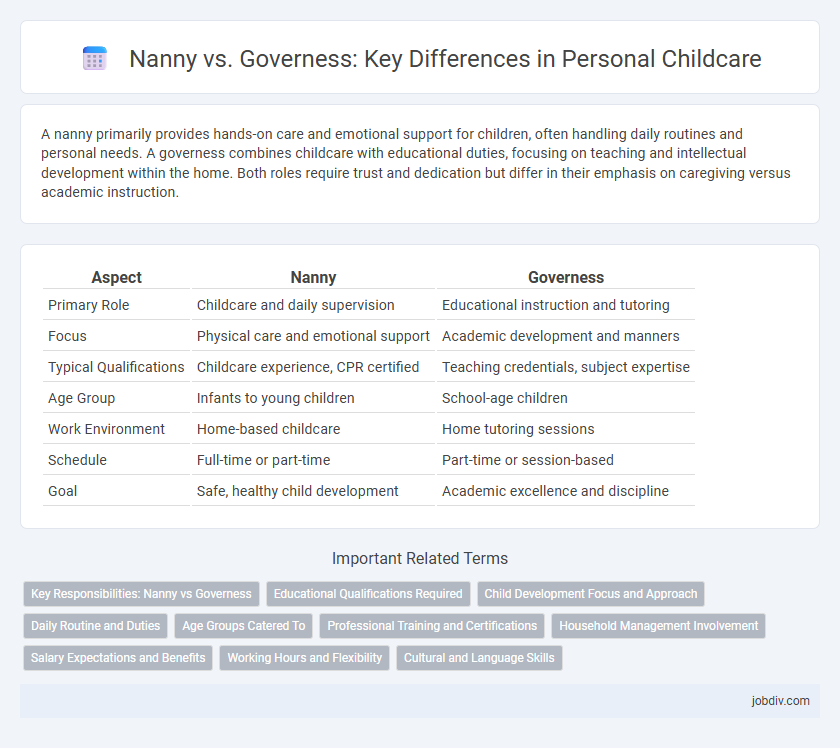A nanny primarily provides hands-on care and emotional support for children, often handling daily routines and personal needs. A governess combines childcare with educational duties, focusing on teaching and intellectual development within the home. Both roles require trust and dedication but differ in their emphasis on caregiving versus academic instruction.
Table of Comparison
| Aspect | Nanny | Governess |
|---|---|---|
| Primary Role | Childcare and daily supervision | Educational instruction and tutoring |
| Focus | Physical care and emotional support | Academic development and manners |
| Typical Qualifications | Childcare experience, CPR certified | Teaching credentials, subject expertise |
| Age Group | Infants to young children | School-age children |
| Work Environment | Home-based childcare | Home tutoring sessions |
| Schedule | Full-time or part-time | Part-time or session-based |
| Goal | Safe, healthy child development | Academic excellence and discipline |
Key Responsibilities: Nanny vs Governess
Nannies primarily handle daily childcare duties such as feeding, bathing, and organizing play activities, ensuring the child's physical well-being and routine. Governesses focus on education and intellectual development, teaching subjects like reading, writing, and manners in a structured environment. Both roles may overlap, but nannies emphasize caregiving while governesses prioritize academic growth.
Educational Qualifications Required
A nanny typically requires certification in childcare, such as CPR and first aid, with experience in child development being highly valued. Governesses usually hold advanced qualifications, including degrees in education or specialized training in child psychology and pedagogy. The educational background of a governess is often more formalized to support structured academic learning and personalized curriculum development.
Child Development Focus and Approach
A nanny provides practical childcare with an emphasis on daily routines, emotional support, and social development through play and interaction. A governess focuses on structured education, promoting cognitive growth and academic skills tailored to the child's curriculum. Both roles contribute uniquely to child development, balancing emotional well-being and intellectual advancement.
Daily Routine and Duties
A nanny typically manages the daily routine by providing hands-on childcare, including meal preparation, playtime, and school runs, ensuring children's well-being throughout the day. A governess emphasizes educational duties, overseeing homework, tutoring in subjects like languages and arts, and fostering intellectual development within a structured schedule. Both roles require consistency, but the nanny leans towards caregiving while the governess prioritizes formal learning and discipline.
Age Groups Catered To
Nannies typically care for children from infancy through early childhood, focusing on ages 0 to 5 years, providing hands-on support with daily routines and developmental activities. Governesses generally cater to older children, often between ages 5 and 12, specializing in academic instruction and etiquette within the home environment. The distinct age groups reflect the differing roles, with nannies emphasizing caregiving and governesses emphasizing education.
Professional Training and Certifications
Nannies typically receive specialized training in child care, first aid, and early childhood development, often earning certifications like CPR and pediatric first aid to ensure children's safety and well-being. Governesses undergo formal education in specific subjects such as literature, languages, and mathematics, often holding teaching credentials or degrees in education to provide academic instruction at home. Professional training for governesses emphasizes curriculum development and pedagogy, while nannies focus more on practical child care skills and emotional support.
Household Management Involvement
A nanny primarily focuses on childcare, including daily routines and emotional support, while a governess handles educational instruction alongside supervising children's behavior. In terms of household management involvement, a governess may coordinate schedules and assist with academic activities, but a nanny often engages directly with household tasks related to child care such as meal preparation and organizing playtime. Families seeking comprehensive household management typically require clear role definitions to optimize support between childcare and educational responsibilities.
Salary Expectations and Benefits
Nannies typically earn between $25,000 and $60,000 annually, with salaries varying based on experience and location, while governesses often command higher wages ranging from $40,000 to $80,000 due to their specialized educational roles. Nannies usually receive benefits like room and board, flexible hours, and health insurance, whereas governesses may benefit from formal employment contracts, pension plans, and structured professional development. The salary discrepancies reflect the distinct responsibilities, with nannies focusing on childcare and daily activities and governesses providing tailored academic instruction and tutoring.
Working Hours and Flexibility
Nannies typically offer more flexible working hours, often accommodating evening or weekend shifts based on family needs, while governesses generally work set hours aligned with a child's academic schedule. Nannies may provide full-time live-in or live-out care, adapting to varying daily routines, whereas governesses maintain structured, daytime hours focused on educational support. This distinction makes nannies suitable for dynamic caregiving demands, whereas governesses prioritize consistency and educational development.
Cultural and Language Skills
A nanny typically provides childcare with a focus on daily care routines and emotional support, often adapting to the family's cultural environment but without formal educational duties. In contrast, a governess specializes in teaching children academic subjects and language skills, emphasizing cultural education and fluency in multiple languages. Families seeking a blend of personalized childcare and structured language or cultural development often prioritize the expertise of a governess.
Nanny vs Governess Infographic

 jobdiv.com
jobdiv.com